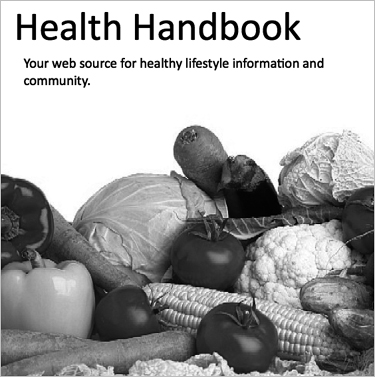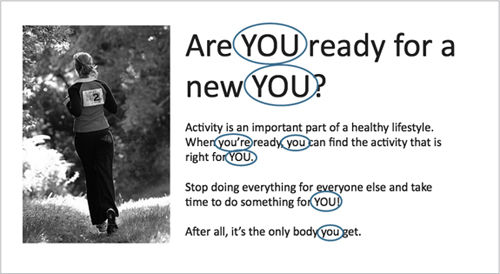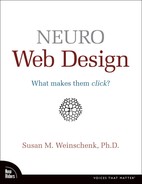
YOU ARE WALKING down a dark street. You are all alone. You hear footsteps behind you. Your heart starts beating faster. You can hear the blood throbbing in your veins.
Do I have your attention now?
You, you, you, you, you, you, you.
You are hungry. You are cold. You are bored. Your ideas are important. You want this. You want that.
You, you, you, you, you, you, you.
Your primitive old brain is wired to care about you. To the old brain, everything is all about you. You are all that matters. In the scenario where you’re walking down the dark street, I grabbed your attention in multiple ways:
• First, it was a story (for more information about stories, see Chapter 10).
• Second, it sounded dangerous, which your old brain is very interested in.
• Third, it started with the word “you” and included seven references to “you” or “your” within only five sentences.
Your old brain is wired to keep you alive. It’s all about survival. Therefore, nothing is more important to your old brain than you. Your old brain is constantly scanning the surroundings looking for anything that might be a threat to your survival, as well as looking for opportunities to eat and to have sex.
I apologize about being blunt, but this is the reality of the old brain. Physical survival, food, and sex are really what the old brain focuses on. It is therefore very skilled at noticing what has changed. It is scanning all the time looking for changes and then quickly evaluating any changes in your environment in terms of survival, food, or sex.

The old brain is constantly scanning the environment looking for any changes that signal danger, food, or sex.
Danger, Sex, and Food
READ THIS paragraph:
“This software has many built-in features that allow for photos to be uploaded, organized, and stored. Photos can be searched for with only a few steps.”
Now read this paragraph:
“You can upload your photos quickly, organize them any way you want to, and then store them so that they are easy to share with your friends. You can find any photo with only a few steps.”
Which product would you buy? You’d likely buy the one that says “you” and “your.” This is not a conscious decision. Your non-conscious old brain will tell you that the second product is better for you.
In many cultures, being so self-focused is seen as negative. It is classified as selfishness. And certainly there are times when you want to be unselfish. But it is a fact of nature that if you want to get and hold the attention of humans, and if you want to get them to take action, you need to engage the old brain.
Basically, you have only a few ways to engage the old brain: danger, sex, and food.
Do something threatening
Since a major job of the old brain is to keep us from harm, anything threatening our survival will get the old brain’s attention. The threat doesn’t have to be directed at us. Even watching a movie or an ad (not a real situation) of someone else in harm (not you) will set off all the alarm bells of the old brain. So if we are watching a video of a scary car chase scene, our old brain is yelling, “Be careful, be careful!”
When the old brain sounds an alarm, all of our information processing and emotional processing systems are on high alert and highly functioning. This means that anything happening while we’re on high alert will be processed deeply and emotionally in our memory (Medina, 2008). There is an entire branch of marketing now focusing on activating the old brain and then feeding it product information.
As such, there are television commercials that use a dangerous situation (for example, a car chase) that culminates with someone receiving a particular brand of soda or a particular credit card. The idea is that all of our systems are on heightened alert, so we will remember the product, and we will also attach strong emotions to it. In terms of attention-getting and deep-encoding in memory, it actually doesn’t matter if we are scared or exhilarated; it doesn’t matter if the emotions we are feeling are “positive” or “negative.” What matters is that our systems are all on high alert.

We pay attention to anything that happens when we are in an emotionally arousing situation. We also remember it more deeply.

Because the old brain cares about safety and danger, any pictures or headlines that look or sound frightening will automatically get our attention.
Show food
We pay attention to food. In order to grab our attention with food, the food should be shown prominently. Showing a picture of people sitting at a restaurant implies food, but to capture the old brain’s attention, the food must be very obvious.
If a Web site is about food, it will easily grab and hold our attention. What’s important is that it shows luscious photos of the food.

Food Web sites will grab our attention easily as long as there are gorgeous pictures of the food.
Even a site that is not necessarily selling food might be able to use the allure of food to grab and hold our attention.

Pictures of food are effective even at Web sites that aren’t selling food.
Imply sex
We all know that sex, or the implication of sex, is a powerful attention-getting technique. Sex is so powerful as an attention-getting technique that it can snag our attention with even the subtlest of associations. A certain look to the eyes, a flash of skin—these are all powerful enough to engage our attention.

Even just a subtle look in the eyes can imply sex and draw our attention.
Don’t Let Them Get Bored
IF A WEB site is about sex or food or danger, it will probably engage the old brain and grab attention. But what about sites that have nothing to do with sex, food, or danger? Can they grab attention, too?
Is there anything else that will grab the attention of the old brain?
All you need is change
Because our old brain is constantly scanning the environment, any change in the environment will be noticed. This is why banner ads that move or change at a Web site are so effective at getting attention (and also why they are so annoying, because they keep changing—and every time they change, we just have to look at them). But banner ads are not a good way to provide change at a Web site. Banner ads are good for the product or company being advertised in the banner ad because they attract attention, but they’re not necessarily good for the Web site owner because they draw attention away from the rest of the page.
Banner ads are not the only thing that can change on a Web site. Many Web sites have other information that changes or moves (for example, scrolling products or a video that starts up automatically).
Any change on the site will grab the attention of the old brain. You can use photos that cycle through or even headlines that change. For example, Borders often uses a scrolling banner of popular books on their home page. WebMD uses photos and headlines that change every five seconds, highlighting articles that you can click on for more information. And ESPN has multiple locations on their Web site that change: a banner at the top is animated, a video plays automatically on the right, and towards the bottom there is a changing display of sports headlines with photos.
The upside is that if something changes at the site every few seconds, our old brain—and hence our attention—will be engaged. The downside is that because our attention is constantly drawn to that part of the page, we have a hard time looking at (or focusing on) anything else. Also, there is data that suggests young people tolerate this kind of movement well, but older people find it so distracting and annoying that they might leave. Web sites should be aware of their audiences and use movement judiciously.
As powerful as movement is at grabbing and holding attention at a Web site, it’s not all that you can do. Just by simply using the word you, you will get the attention of the old brain.

Using the word “you” is an automatic way to grab the attention of the old brain. Here we’ve circled all the times that the word “you” appears on the page.


